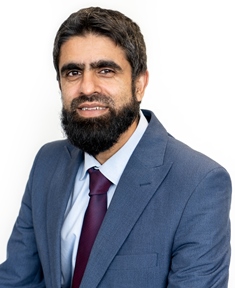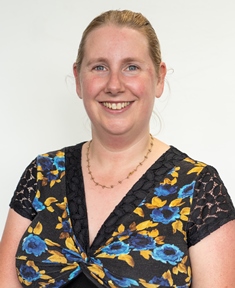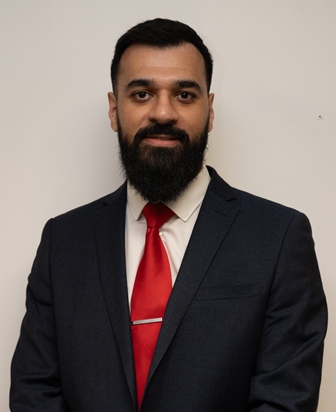Mathematics
Our Directors of Learning design sequences of lessons which combine with our Personal Development Programme delivered by Form Tutors. These closely align with our mission to ‘Teach What Matters’, a deliberate approach to ensure we address challenges that our students are likely to face and to give them the best possible chance of meeting their limitless potential.
We want all Holyhead students to be able to;
- Solve problems
- Apply knowledge to the real world
- Adapt to change and be resilient to failure
- Be aware of their own thought processes and memory (meta cognition)
- Be articulate and express themselves
- Think critically
We want all students at Holyhead to be strong in relation to the following attributes;
- Leadership
- Organisation
- Resilience
- Initiative
- Communication
We also want them to recognise the best of human thinking and appreciate the fundamental British Values.

Mr T Tariq
Director of Learning for Mathematics

Mrs J Lloyd
Assistant Director of Learning for Mathematics

Mr N Sanger
Lead Practitioner for Mathematics
Our curriculum in Mathematics forms a backbone to our ethos statement to Teach What Matters. We want our students to think like mathematicians, not just DO the maths and therefore our aim is to create the very best Mathematicians. The need for students to develop mathematical thinking in and out of the classroom is at the crux of being able to fully master mathematical concepts. We challenge students to think, act and speak like those working in the field would. We do this through using quality first teaching which ensures students understand underlying Mathematical principles and can apply them in a variety of familiar and unfamiliar contexts. We encourage our students to learn about mathematicians from diverse backgrounds. Mathematicians who are inspiring and who they can resonate and identify with, be it Mary Jackson or Elbert Frank Cox. In recognising that mathematics is a skill we use daily and a skill we need in life, we want our students to understand that they can use the maths they learn to unlock doors of opportunity for their future aspirations. We believe that pupils should be encouraged to use mathematical language throughout their maths learning to deepen their understanding of concepts. The way students speak and write about mathematics has been shown to have an impact on their success in mathematics. We, therefore, aim to use a carefully sequenced, structured approach to introducing and reinforcing mathematical vocabulary throughout maths lessons, so students have the opportunity to work with word problems from the beginning of their learning. To assist with the retention of maths knowledge meta cognitive strategies are being used alongside regular retrieval and modelling. At Holyhead, we want the learning experience of students to be able to; explore, wonder, question, conjecture, experiment and make theories in order to guide their own journey.
Key Stage 3
We aim to ensure that all students:
- Become fluent in the fundamentals of mathematics, including through varied and frequent practice with increasingly complex problems over time, so that students develop conceptual understanding and the ability to recall and apply knowledge rapidly and accurately.
- Reason mathematically by following a line of enquiry, conjecturing relationships and generalisations, and developing an argument, justification or proof using mathematical language
- Can solve problems by applying their mathematics to a variety of routine and non-routine problems with increasing sophistication, including breaking down problems into a series of simpler steps and persevering in seeking solutions.
Number
- Understand & use place value in calculations.
- Understand & use negative numbers (directed numbers).
- Understand & use a variety of mathematical vocabulary.
- Identify when to use BODMAS / BIDMAS.
- Use written methods for calculations
- Recognise & use powers and roots in calculations.
- Equivalence of Fractions, Decimals and Percentages.
- Define & interpret percentages.
- Round numbers to an appropriate degree of accuracy.
- Estimation and approximation
Algebra
- Understand algebraic notation.
- Substitute values into formulae.
- Simplify & manipulate algebraic expressions.
- Change the subject of formulae.
- Solve linear equations.
- Recognise, sketch & produce linear & quadratic graphs.
- Understand properties of graphs.
- Generate terms of a sequence & generate the nth term.
- Recognise arithmetic & geometric sequences.
Geometry and Measure
- Find area, perimeter & volume of shapes and solve associated problems.
- Understand & use angle properties.
- Derive & use standard constructions.
- Recognise & use properties of polygons.
- Understand congruence & similarity.
- Perform & describe transformations.
- Understand & use Pythagoras’ Theorem.
- Understand & use trigonometry.
Ratio, proportion and rates of change
- Change between units (time, length, area, volume/capacity, mass)
- Use scale factors in a variety of situations.
- Work with fractions.
- Work with ratio.
- Work with percentages (including percentage change)
- Solve problems involving direct & inverse proportion.
- Use compound units such as speed, unit pricing and density.
Probability
- Understand the difference between experimental & theoretical probabilities.
- Understand that the probability of outcomes sum to 1.
- Understand the probability scale
- Organise sets of data systematically using tables & Venn diagrams.
- Understand the language associated with probability.
- Understand and use sample space diagrams.
Statisitics
- Identify different types of data (discrete/continuous/grouped)
- Construct and interpret appropriate diagrams for a variety of data.
- Find a use averages (mean, median, mode)
- Find and use range to describe data.
- Describe simple relationships between data.
- Construct and interpret scatter diagrams.
Key Stage 4
In Key Stage 4, all students study the Pearson Edexcel GCSE Mathematics course.
Pearson Edexcel Level 1/Level 2 GCSE (9-1) in Mathematics
Qualification aims and objectives
The aims and objectives of the Pearson Edexcel Level 1/Level 2 GCSE (9–1) in Mathematics are to enable students to:
- Develop fluent knowledge, skills and understanding of mathematical methods and concepts
- Acquire, select and apply mathematical techniques to solve problems
- Reason mathematically, make deductions and inferences and draw conclusions
- Comprehend, interpret and communicate mathematical information in a variety of forms appropriate to the information and context.
GCSE (9-1) MathematicsDate: Jun 23, 2021
Key Stage 5
KS5 Curriculum Intent:
Students studying A-level mathematics at Holyhead will study Pure mathematics and applied mathematics modules which consist of Statistics and Mechanics. The course has been selected to build upon skills and knowledge acquired at KS4. The specification will enable students to develop their understanding of pure modules from their learning at GCSE. It will also introduce the applied modules to students who may not have been introduced to Mechanics previously in mathematics and may have studied it from a Physics perspective which will develop their critical thinking skills and widen their knowledge. Statistics will be studied more in-depth from GCSE allowing for further application to the real world through the topics studied. Students will use their knowledge and skills to develop their understanding of pure mathematics, statistics and mechanics. This will give students transferable skills for higher education through developing their problem-solving skills and allowing them to reflect on their understanding of mathematics.
Pearson Edexcel Level 3 GCE A Level in Mathematics
| Knowledge | Attributes/Character | Skills | Experience | ||
|---|---|---|---|---|---|
| Year 12 |
|
• SMSC • Responsibility • Respect • Communication • Resilience • Perseverance |
• Algebraic manipulation • Analysis – to be able to identify and analyse skills needed in each question • Application of mathematical processes in problem-solving situations • Interpretation of large data sets |
• Mathematics inspiration trip • Maths popular lecture |
|
| Year 13 | • Functions and graphs • Sequences and Series • Radians • Trigonometric functions and modelling • Numerical methods • Parametric equations • Integration • Differentiation • Vectors • Constant acceleration • Forces and motion • Variable acceleration • Moments • Friction • Projectiles • Application of forces • Further kinematics |
• SMSC • Responsibility • Respect • Communication • Resilience • Perseverance |
• Algebraic manipulation • Analysis – to be able to identify and analyse skills needed in each question • Application of mathematical processes in problem-solving situations |
• Maths popular lecture |
The fundamental principles and concepts that students need to acquire in order to progress successfully through the curriculum in Maths:
-
Students need to be proficient in algebraic manipulation
-
Students must grasp transformations of graphs using both visual and algebraic methods
- Students must be able to understand the process of differentiation and the purpose of it as well as integrating being the reverse of differentiating
- Students must be able to understand and use the laws of basic probability
- Students must be able to differentiate between different statistical distributions and understand which to apply to different scenarios
- Students must understand what the basic principles of forces and motions are
Students begin with Algebraic expressions, Quadratics, Equations and Graphs. These topics are introduced at KS3 and developed in KS4, however, students advance on their knowledge by working on more problem-solving questions throughout the first term which builds on prior knowledge. These topics build the basis of the topics in the remaining part of the course. They are not the easiest topics in the course but are not the most difficult so allows students to transition onto the course and enable them to build on prior learning. The teaching of Statistics is left until the second half of the autumn term to allow for students to develop their knowledge on pure mathematics and have a solid start up on the pure content which is needed for much later on in the course.
Year 12
Mathematics starts by focusing on the key concepts which are required in the course. The link to prior knowledge from KS3 and KS4 which enables students to use their understanding to develop their skills. The students complete Statistics in Year 12, so they are able to understand the links between the content in year 12 and year 13. Students are able to develop their understanding of, for example, probability as the conditional probability is studied alongside basic probability rather than allowing it to drag on for a year and split the content over two academic years.
Year 13
Year 13 topics allow for students to develop their knowledge from year 12. Students need to have grasped their knowledge from year 12 and be fluent with the skills to progress through year 13. Mechanics is later on in the term to allow for students to focus on the core skills in pure mathematics. Mechanics is set out in a way to ensure that students develop on their learning throughout year 13 and are making links throughout.
What key steps will be taken to ensure that students gain a broad and balanced knowledge within Maths?
Although there is some familiarity within the early topics in terms of prior knowledge, there is a deliberate attempt to start KS5 in a fresh manner and in a way that sets the bar. GCSE knowledge is built upon in a staggered manner, so it’s not just a case of the start of KS5 looking like a revisit of KS4, whilst at the same time continually weaving in topics that should be familiar from KS4. Time is spent in year 12 building exam skills and enabling students to be able to answer questions in an examination context. The discipline required to study mathematics will benefit students who not only wish to study mathematics at a higher level but those who wish to go onto any field of study as they will be working independently and have to develop their organisation skills.
A-Level MathematicsDate: Jun 30, 2021
Level 3 MathematicsDate: Jun 30, 2021

